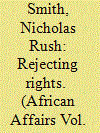| Srl | Item |
| 1 |
ID:
082351


|
|
|
|
|
| Publication |
2008.
|
| Summary/Abstract |
This article considers Patricia Owens' Between War and Politics in the light of its important critique of political moralism. For Owens, following Arendt, the instrumental use of violence in the political domain is dangerous if it serves abstract ends. The moral 'wars' of neo-conservatism and humanitarian interventionism embody this danger. I argue that this conflation of neo-conservative foreign policy and progressive liberalism is misguided, it underestimates the latter's increasing mediations between norm, legality and power. A critique of present moralization of politics should emphasize codification of rights to delimit the procedural framework within which international intervention can be made legitimate
|
|
|
|
|
|
|
|
|
|
|
|
|
|
|
|
| 2 |
ID:
139632


|
|
|
|
|
| Summary/Abstract |
Academic and policy interest in the emergence, development, and efficacy of rights has increased substantially over the last twenty years. One particular effect that scholars have recently identified is the connection between the spread of rights across the globe and large-scale reductions in violence. While the expansion of rights may enable reductions in violence, the evidence in this article suggests the opposite may also be true. Drawing on ethnographic research on vigilantism in South Africa, a country deeply invested in the twentieth century rights revolution, the article shows how vigilantes have used the state's expanding rights regime to justify violence. Specifically, it examines the growth and spread of what was at one time South Africa's largest vigilante group, Mapogo a Mathamaga. Mapogo first emerged shortly after the country's transition to democracy and rapidly grew as its leadership preached a gospel that rejected rights, claiming that rights enabled crime and allowed immorality to proliferate. By assaulting suspected criminals, Mapogo's members claim that they are correcting the criminal, the post-apartheid state, and the flawed rights regime on which it is based, an outcome which the existing literature on rights and violence has difficulty explaining.
|
|
|
|
|
|
|
|
|
|
|
|
|
|
|
|